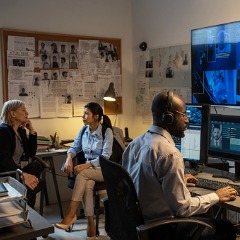 Interviews
Interviews
While pursuing a career in forensics, you may find yourself discovering a specialization within your area of study that you feel compelled to explore and research further. For those who have an idea of where they want to focus their forensic studies as well as those who may not know yet, you’re in the right place!
Here in our interviews section, you will find a variety of exclusive stories from nationally recognized forensic experts and top advocates from varying professional fields in the forensic community. Read their stories on how they discovered their passions within the field, obstacles they faced along their way, and how they managed to stand out among the crowd and pave the path for prospective students like yourself. You may even find a professor worth contacting to discuss their research further, while simultaneously building your own professional network. Don’t be shy! Scroll through our interview archive to find your next academic inspiration in the field of forensics.

Facial identification is one of the newer, sharper arrows in the forensic scientist’s quiver. Like fingerprint and DNA analysis, it draws from unique biological markers to identify suspects, victims, and persons of interest. In an increasingly recorded world, the applications of facial identification are vast, and AI and machine learning innovations are making the process quicker and more exact.

Forensic training is going virtual. The ability to recreate elaborate crime scene scenarios in virtual reality (VR) has opened up new forms of education for future forensics professionals. Purdue University Northwest (PNW) has already implemented cutting edge VR training developed at the University's Center for Innovation through Visualization and Simulation (CIVS) and marketed by CBF Forensics.

In the landscape of forensic science, one of the most transformative developments has been the advent and refinement of touch DNA analysis. This cutting-edge technique, which allows forensic experts to extract and analyze genetic material from the mere remnants left by a person’s touch, has broadened the usefulness of biological evidence in criminal investigations.

Forensic AI: The Increasing Automation of Legal Studies
Artificial intelligence (AI) penetrates nearly every sector of the modern world, and law and legal studies are no exception. Intelligent algorithms are revolutionizing legal studies by automating numerous tasks that have historically been labor-intensive and time-consuming. From document analysis to case prediction, AI-driven automation is becoming increasingly prevalent, eliminating the need for tedious paperwork and enabling more efficient and accurate work.

Forensics, Fentanyl & New Drug Detection
What you don’t know can kill you. Consider America’s drug overdose epidemic, which according to CDC estimates, claimed over 100,000 lives in 2022. Many of those deaths resulted from fentanyl, a synthetic opioid that often masquerades as heroin, but can be up to 50 times stronger in its effects.

Social Engineering: How Hackers Trick People Into Giving Up Secure Data
Social engineering is the act of manipulating someone into giving up secure data. Unlike more technical types of cyber attacks, which target the zeroes and ones, social engineering’s methods can appear almost charmingly analog, but that makes them no less dangerous. Hackers using social engineering know that the most vulnerable element in any network is often the human being using it.

The Role of Open Source Intelligence (OSINT) in Investigations
Open-source intelligence (OSINT) is the collection and analysis of data gathered from public sources. Dating back to the 20th century, and once purely the domain of the military and intelligence communities, today’s internet-connected and data-driven world has brought OSINT into a wide array of investigations and firmly placed it in the mainstream.

The Increasing Digitization of Investigations
As society has gotten more digital and high-tech, so have investigations. Digital forensics is an increasingly crucial aspect of evidence collection and analysis. Today, evidence exists in bits and bytes that can trace back to before the commission of any particular crime.


